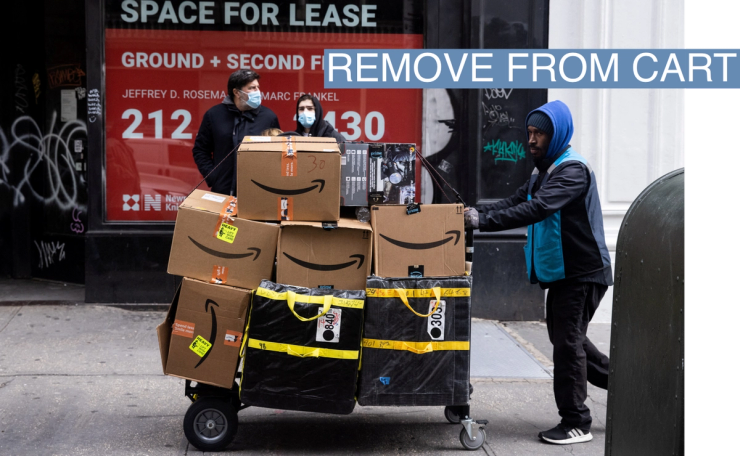This was a chaotic year for the technology industry, and not just because Elon Musk became the CEO of Twitter. Other companies that had grown rich and powerful during the old paradigm of the 2010s saw their stock prices crater and their dominance subside. Shares in Facebook parent Meta Platforms nosedived almost 65% this year, compared to a 30% drop for the Nasdaq. These are the stories that drove the chaos:
- Misreading consumer demand: In the early days of the pandemic, people flocked to products and services well-suited for COVID-19 lockdowns, like Amazon Prime, Peloton stationary bikes, and therapy apps. But tech firms erred by assuming the changes were permanent. When the world began loosening restrictions, consumers largely went back to their old ways, and layoffs and restructurings followed.
- Metaverse mistake: Many tech companies, most notably Meta, spent 2022 doubling down on the so-called metaverse, an immersive virtual world where it turns out few people actually want to hang out. Tech executives struggled to explain the reasoning behind their pivot to the metaverse, but that didn’t stop corporate brands from adopting it as a catch-all buzzword. Months later, nothing concrete has really emerged from all that hype.
- Crypto bust: It’s been a really, really bad year for crypto. Need I say more? The price of every major cryptocurrency plunged and billions of dollars were lost to hackers and fraudsters, causing consumers to lose trust in the industry. Now, just 8% of people in the U.S. say they have a positive opinion of crypto. The only real winner at the moment is North Korea, which South Korean authorities say has stolen over $1 billion in crypto assets in the last five years.
- Workers gaining power: Organized labor cracked high-profile, anti-union tech giants, with workers at two Apple stores and an Amazon warehouse in New York forming unions. Corporations tried using traditional anti-union tactics to squash these efforts, but were met with fierce resistance and widespread backlash on social media. Plus, when employees brought complaints to the Joe Biden administration’s labor board, it repeatedly sided with them over employers.
- The great decoupling: When Biden took office, many analysts expected him to return to the Obama-era China strategy, prioritizing giving Beijing carrots over sticks. But 2022 proved that Biden is just as much of a China hawk as Donald Trump was, particularly when it comes to technology policy. Biden placed export controls on dozens of Chinese tech firms and announced tough restrictions on advanced semiconductors and related technology sent to the People’s Republic. The radical measures signaled that the U.S. is serious about “decoupling” its tech sector from Beijing.

Next year, the tech industry will continue grappling with many of the same issues it did in 2022, as well as some new ones. Here’s what we’re paying attention to:
- Workers losing power: If the U.S. economy goes into a recession, expect workers to lose the leverage they gained over their bosses during the past few years. In 2022, some CEOs, like Coinbase’s Brian Armstrong, declared they were sick of navigating politics at work and wanted their employees to focus solely on their jobs. That trend will continue into 2023, especially if bosses look to Elon Musk’s brutal takeover of Twitter as inspiration for their own management strategy.
- The moment for generative AI: In 2022, the public became enamored with generative artificial intelligence programs like DALL-E and ChatGPT, marveling at their ability to instantly produce original images and answers to questions. Next year, companies will start integrating that tech into commercial products. The market will then decide whether generative AI is mostly a toy, or the start of a revolution that will transform the world.
- Cross-border e-commerce: Even as the U.S. and China grow further apart politically, American consumers remain reliant on affordable goods produced in the People’s Republic. Next year, more companies based in China will try to reach online shoppers in the U.S., in an effort to replicate the success of Chinese fast fashion giant Shein and bargain shopping app Temu.
- Time to “touch grass”: As more people begin putting the pandemic in the rearview mirror, travel and in-person entertainment will continue surging in popularity. Startups that cater to these industries will boom, especially those that can offer unique experiences and better-than-average value. Airbnb has had this space to itself, but now it may face some stiff competition.
- Restrictions on social media: For years, Republicans have argued that social media platforms shouldn’t have the power to censor conservative viewpoints. In 2023, the Supreme Court will call their bluff. The justices will decide whether to uphold laws passed in Florida and Texas that make it illegal to remove content based on political perspectives. If the conservative-leaning court rules in favor of the states, sending YouTube, TikTok, Facebook, and other sites scrambling to comply with the new regulations.
AD
